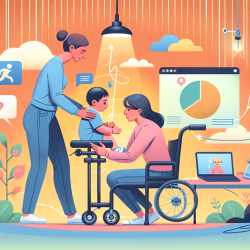Introduction
As practitioners dedicated to improving pediatric care, it's crucial to stay informed about innovative strategies that can enhance outcomes for critically ill children. The PICU Up! trial offers a compelling case for the integration of early mobility interventions in pediatric intensive care units (PICUs). This blog delves into the trial's findings and their implications for clinical practice, encouraging practitioners to adopt data-driven approaches to pediatric care.
The Importance of Early Mobility
Research indicates that over 50% of critically ill children develop preventable morbidities during their stay in the PICU. These include muscle weakness, delirium, and other conditions that can impede recovery. The PICU Up! trial seeks to address these issues by evaluating the impact of a multifaceted early mobility intervention on outcomes such as mechanical ventilation duration, delirium incidence, and functional status.
Key Findings from the PICU Up! Trial
- Reduced Mechanical Ventilation Duration: The trial's primary outcome was to assess the days alive free of mechanical ventilation. The findings suggest that early mobility can significantly decrease the duration of mechanical ventilation, a critical factor in improving recovery.
- Improved Functional Status: Secondary outcomes included improvements in delirium and functional status. The trial demonstrated that early mobility interventions could enhance these outcomes, contributing to better long-term recovery.
- Interprofessional Collaboration: The trial emphasized the importance of a team-based approach, integrating various healthcare professionals to deliver comprehensive care.
Implications for Practitioners
For practitioners, the PICU Up! trial underscores the importance of incorporating early mobility strategies into routine care. Here are some actionable steps:
- Adopt a Data-Driven Approach: Use the trial's findings to inform clinical decisions, ensuring that interventions are evidence-based.
- Enhance Interprofessional Collaboration: Foster a team-based environment where different healthcare professionals can contribute to patient care.
- Monitor and Evaluate Outcomes: Regularly assess the effectiveness of mobility interventions and adjust strategies based on patient needs and outcomes.
Encouraging Further Research
While the PICU Up! trial provides valuable insights, it also highlights the need for ongoing research in pediatric care. Practitioners are encouraged to explore further studies and contribute to the growing body of evidence supporting early mobility interventions.
Conclusion
The PICU Up! trial offers a promising approach to improving outcomes for critically ill children. By implementing early mobility strategies and fostering interprofessional collaboration, practitioners can enhance recovery and quality of life for their young patients.
To read the original research paper, please follow this link: Impact of a multifaceted early mobility intervention for critically ill children — the PICU Up! trial: study protocol for a multicenter stepped-wedge cluster randomized controlled trial.










